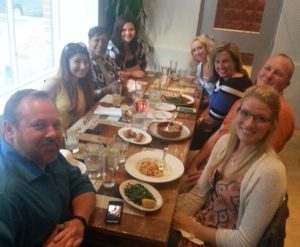ALSO Sponsors STOP Grant Recipients to Attend NNEDV’s 2016 Tech Summit
 Pictured counterclockwise around the table: Todd Burkett (Project Woman), Ola Saad (SafeHouse Center), Stephanie Battle (SafeHouse Center), Lacy Robbins (Jena Band of Choctaw Indians), Stacie Farcin (West Virginia Foundation for Rape Information and Services), Marsha Kirschner (West Virginia Foundation for Rape Information and Services), Anthony Craigo (Putnam County Sherriff's Department), Lindsey Criswell (Project Woman)
Pictured counterclockwise around the table: Todd Burkett (Project Woman), Ola Saad (SafeHouse Center), Stephanie Battle (SafeHouse Center), Lacy Robbins (Jena Band of Choctaw Indians), Stacie Farcin (West Virginia Foundation for Rape Information and Services), Marsha Kirschner (West Virginia Foundation for Rape Information and Services), Anthony Craigo (Putnam County Sherriff's Department), Lindsey Criswell (Project Woman)
The National Network to End Domestic Violence held its 4th Annual Tech Summit in San Francisco on July 25-27, 2016 and ALSO, through our LINK Travel Assistance Program, sponsored the attendance of 8 participants at this event. This group of LINK Program participants included staff members from Project Woman in Springfield, OH, SafeHouse Center in Ann Arbor, MI, West Virginia Foundation for Rape Information and Services in Fairmont, WV, Putnam County Sheriff’s Department in Winfield, WV, and the Jena Band of Choctaw Indians, a tribe headquartered in Jena, LA.
NNEDV’s 3-day summit focused on the various complex issues and concerns that come from the intersection of technology and domestic and sexual violence, stalking, and trafficking. Presenters talked about the various ways technology is helpful to survivors but is also misused by abusers and perpetrators to keep victimizing. As it goes hand-in-hand with technology, social media was a topic that was touched on in most sessions, especially those focusing on youth.
On Day One of the conference, attendees were welcomed with a session on cellphone safety. In this session, participants learned about apps available to anyone looking for them and are misused to monitor, stalk and harass. A key takeaway from this session is that when we trust those around us, we don’t find it necessary to keep our cellphones locked or put away. This makes it very easy for abusers to install tracking apps without the cellphone owner’s knowledge and allows them to gain complete access to other people’s cellphone and track their every move remotely without physically following them.
At the end of Day One, NNEDV hosted a gathering where they launched their Tech Safety App. The Tech Safety App contains information that helps identify technology-facilitated harassment, stalking, or abuse and has tips on what can be done. The app also helps gather important information that may be useful in protection order and criminal cases against perpetrators of stalking, abuse, and harassment.
Also of special note, was the plenary on Day Two by survivor speaker Jessica Davidson. Author of “My Rapist May Not Know He’s A Rapist,” a blog post and subsequently published article, Davidson is a graduate of University of Denver where she served as Vice President of the Student Body. She decided to take her experience and turn it around by raising awareness, revealing that college students are just not having educated conversations about sex. As a result of her advocacy for other survivors, she was invited to the White House where she received the Champion of Change award from Vice President Joe Biden.
As part of ALSO’s LINK Travel Assistance Program, participants are asked to develop an action plan to take what they learned at the sponsored conference and create concrete goals and objectives to be implemented in their jurisdiction. Participants who attended NNEDV’s summit focused their action plans on safeguarding victim-advocate confidentiality, educating survivors and colleagues about technology safety and use of social media, and crafting policies and procedures for the deletion of sensitive victim information from old electronic devices that are replaced or retired by agencies.
As shared by LINK participants on the post-conference webinar–another key component of the LINK Program–the opportunity to attend a national conference would not have been possible for their agency without the LINK Program. LINK participants, which included representatives from advocacy organizations, law enforcement and TA providers, appreciated the opportunity for continued education on technology advances in order to keep up with those who misuse it to harm others.
Written by Yunuen Herrera
ALSO Program Assistant
In partnership with the U.S. Department of Justice Office on Violence Against Women, ALSO's LINK Travel Assistance Program subsidizes STOP Formula Grant state and territory administrators and sub-grantees to attend national conferences and trainings where they gain knowledge and experience to share and implement in their local communities.

